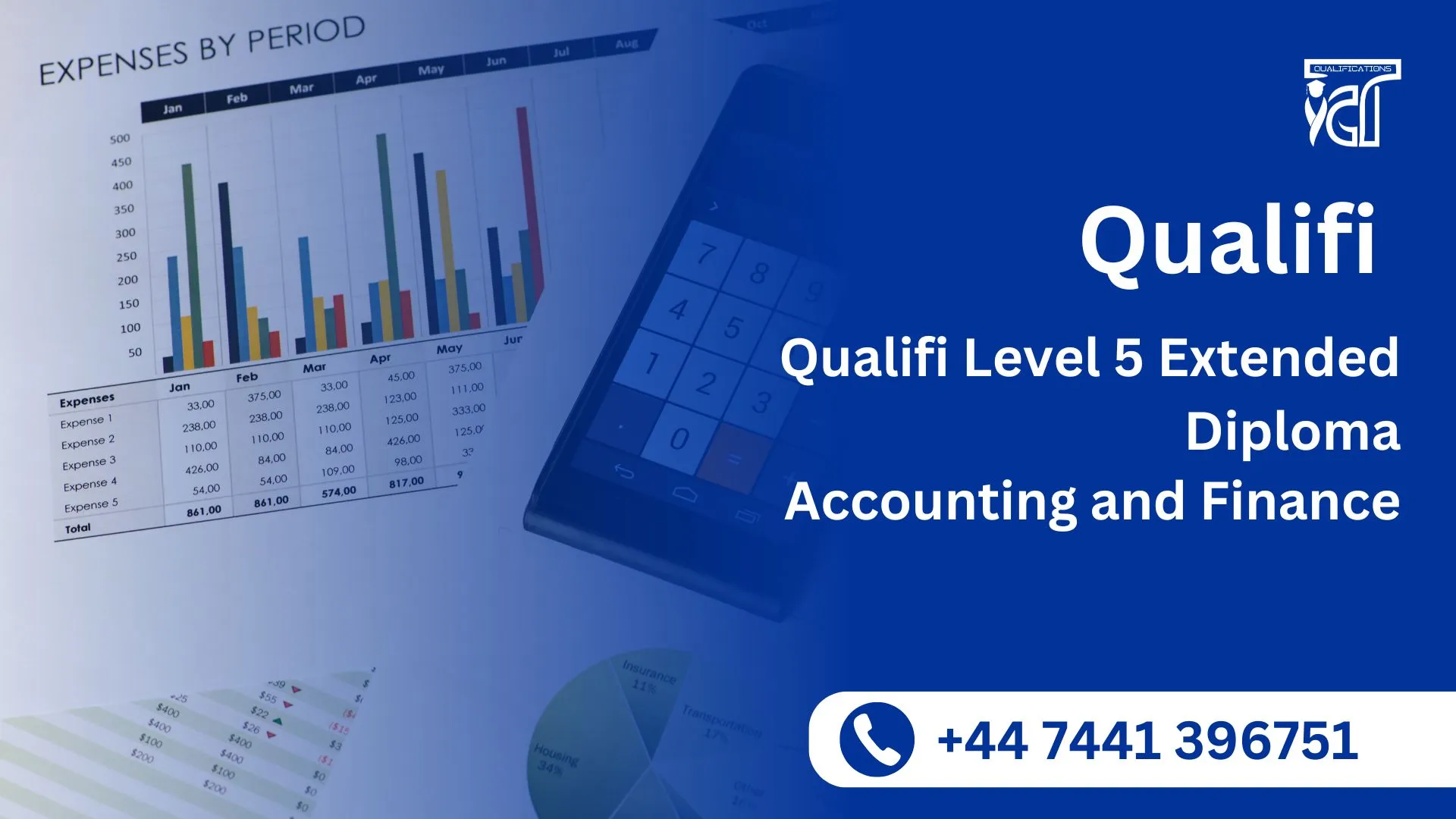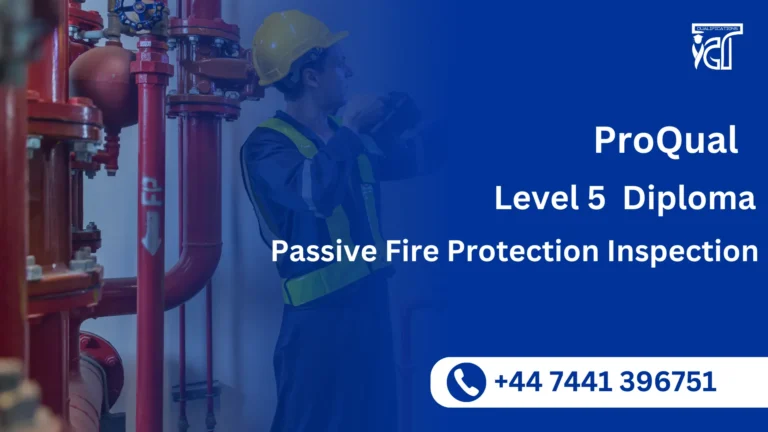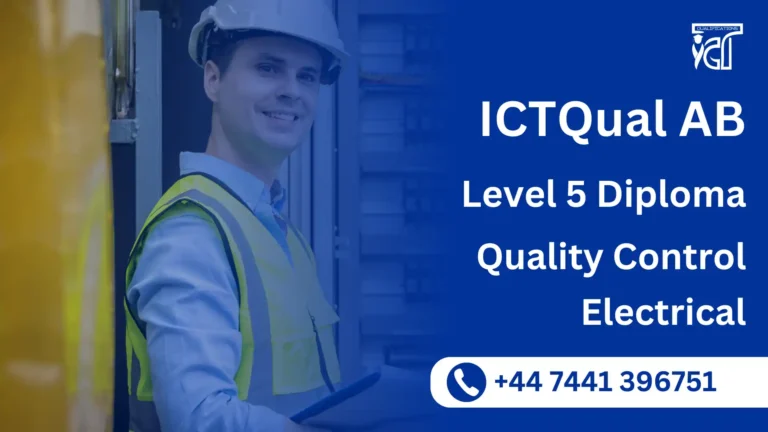The demand for skilled accounting and finance professionals continues to grow, making it essential for individuals to gain recognised qualifications that enhance their expertise and career prospects. The Level 5 Extended Diploma in Accounting and Finance, awarded by Qualifi, provides a comprehensive foundation in financial management, reporting, and strategic decision-making. As an Ofqual-regulated awarding body, Qualifi ensures this programme meets high academic and industry standards.
This qualification is designed for individuals looking to develop practical financial knowledge and analytical skills. It is entirely assignment-based, offering a flexible and practical approach to learning without the need for exams.
This diploma delivers a well-rounded understanding of key financial and accounting principles, equipping learners with the ability to manage financial operations effectively. With a total credit value of 240, this course is equivalent to the second year of a university degree. Upon completion, learners have the opportunity to progress to the final year of an undergraduate degree at a UK university, strengthening their academic and professional credentials.
The Level 5 Extended Diploma in Accounting and Finance provides an excellent opportunity for learners to enhance their financial expertise and career prospects. With a strong focus on practical application and strategic financial decision-making, this qualification is perfect for those aiming to succeed in the finance industry. Whether you are seeking career progression, further education, or business financial management skills, this diploma offers a structured pathway to success.
Qualifi Level 5 Extended Diploma in Accounting and Finance consists of 12 mandatory units having 2400 TQT and 1200 GLH. Learners must complete all mandatory units to achieve 240 Credits.
| Sr# | Unit Title | Credits | GLH |
| 1 | Accounting in a Business Context | 20 | 200 |
| 2 | Economics for Business Mathematical | 20 | 200 |
| 3 | Accounting Methods | 20 | 200 |
| 4 | Financial Accounting | 20 | 200 |
| 5 | Management Accounting | 20 | 200 |
| 6 | Leadership and Management in Accounting | 20 | 200 |
| 7 | Financial Management | 20 | 200 |
| 8 | Financial Planning and Control | 20 | 200 |
| 9 | Financial Reporting | 20 | 200 |
| 10 | Principles and Practices of Taxation | 20 | 200 |
| 11 | Management of People | 20 | 200 |
| 12 | Ethics and Corporate Responsibility in Business | 20 | 200 |
GLH (Guided Learning Hours) and TQT (Total Qualification Time) are terms commonly used in vocational qualifications to help define the amount of time a learner is expected to spend on their studies.
1. GLH (Guided Learning Hours)
GLH refers to the number of hours a learner spends being directly taught, supervised, or supported during their course. This includes the time spent in activities such as:
- Classroom instruction
- Practical workshops
- One-on-one tutoring or mentoring sessions
- Online learning sessions with tutor support
In other words, GLH represents the time that learners are actively engaged with their instructors or learning activities.
2. TQT (Total Qualification Time)
TQT represents the total amount of time a learner is expected to invest in completing a qualification, including:
- GLH (Guided Learning Hours): Time spent on direct learning, as explained above.
- Self-Directed Learning: This includes time spent on independent study, research, assignment completion, preparation for exams, and any other work the learner does outside of direct teaching hours.
TQT is a broader measure that includes all the time required to achieve the qualification. It helps learners and employers understand the overall commitment required for the qualification.
Key Differences Between GLH and TQT:
- GLH focuses on direct learning with guidance or supervision.
- TQT includes GLH as well as independent study time and other learning-related activities.
Example:
If a qualification has a TQT of 600 hours and a GLH of 250 hours, it means the learner should spend 250 hours in direct learning (classroom, online, or tutor-led sessions) and 350 hours on independent study or research.
Learning Outcomes of Qualifi Level 5 Extended Diploma in Accounting and Finance
Accounting in a Business Context
- Understand different types of organisational structures.
- Understand the principles of professional ethics and regulation in accounting.
Economics for Business
- Understand the ways in which macro-economic factors affect organisations.
- Understand the ways in which micro-economics factors affect organisations.
- Understand the ways in which macro-economics and microeconomics relate to the international business environment.
Mathematical Accounting Methods
- Be able to use mathematical techniques in accounting.
- Be able to create and use graphs, charts and diagrams of financial information to inform organisational decision-making.
- Be able to apply statistical methods to provide financial and accounting information.
Financial Accounting
- Value stock and direct materials (i.e. inventory).
- Account for year-end adjustments.
- Prepare the final accounts for sole traders and partnerships.
Management Accounting
- Be able to prepare budgets for an organisation.
- Be able to use standard costing techniques.
- Be able to use capital expenditure and appraisal techniques.
- Understand costing techniques.
Leadership and Management in Accounting
- Understand the application of theories of leadership and management to accounting.
- Understand motivation theory and practice in accounting.
- Understand the role of team working in accounting.
Financial Management
- Understand theories of finance.
- Understand the management of working capital.
- Be able to analyse techniques used to manage global risk.
Financial Planning and Control
- Understand corporate governance as it relates to organisations’ financial planning and control.
- Understand the economic and financial management environment
- Be able to assess potential investment decisions and global strategies
Financial Reporting
- Be able to manage an organisation’s assets.
- Be able to manage control accounts.
- Be able to produce a range of financial statements.
Principles and Practices of Taxation
- Understand the principles of taxation.
- Understand personal taxation.
- Understand business taxation
Management of People
- Understand recruitment and selection
- Understand people management in organisations.
- Understand the role of organisational reward and recognition processes.
- Understand staff training and development.
Ethics and Corporate Social Responsibility in Business
- Understand the relationship between business ethics and Corporate Social Responsibility (CSR) and financial decision-making.
- Understand the nature and role of corporate governance and ethical behavior
- Be able to analyse complex CSR and corporate governance issues in an organisation.
Course Benefits of the Qualifi Level 5 Extended Diploma in Accounting and Finance
Course Benefits
The Qualifi Level 5 Extended Diploma in Accounting and Finance provides numerous advantages for learners looking to advance their careers in financial management, accounting, and investment. This qualification is designed to equip professionals with the essential skills needed to thrive in today’s dynamic financial landscape.
1. Career Growth and Opportunities
Graduates of this diploma can pursue career opportunities in accounting, financial analysis, auditing, taxation, investment management, and business consultancy. The qualification provides a strong foundation for leadership roles in finance and accounting departments.
2. Progression to a University Degree
With a total of 240 credits, learners can advance to the final year of an undergraduate degree in accounting, finance, or a related field at a UK university. This provides a cost-effective and flexible route to earning a full honours degree.
3. Practical, Assignment-Based Learning
Unlike traditional exam-based qualifications, this diploma is assessed entirely through assignments. This allows learners to apply theoretical concepts to real-world financial situations, enhancing their practical problem-solving skills.
4. Flexible Study Structure
Designed for working professionals and students, the course allows learners to study at their own pace. This flexibility makes it ideal for those balancing their education with work or personal commitments.
5. Globally Recognised Qualification
As an Ofqual-regulated programme, this diploma is recognised by employers and academic institutions in the UK and internationally, boosting career prospects and credibility.
6. In-Depth Financial Knowledge
The course covers key financial concepts such as financial reporting, taxation, corporate finance, risk management, and investment analysis. Learners gain the expertise needed to make informed financial decisions and improve business performance.
7. Strong Analytical and Decision-Making Skills
Learners develop critical thinking and financial analysis skills that enable them to interpret financial data, assess business risks, and implement effective financial strategies.
8. Ethical and Professional Development
The course includes modules on corporate governance and business ethics, ensuring that learners understand the importance of ethical financial practices and professional accountability.
9. Increased Earning Potential
A qualification in accounting and finance can significantly increase earning potential, as finance professionals are in high demand across various industries. Graduates can pursue roles such as financial analyst, accountant, tax consultant, or financial manager.
10. Ideal for Entrepreneurs and Business Owners
For those running or planning to start their own business, this diploma provides valuable financial management skills. Understanding financial planning, risk assessment, and budgeting can help entrepreneurs make strategic business decisions.
Conclusion
The Level 5 Extended Diploma in Accounting and Finance is a highly beneficial qualification for those looking to excel in financial management. Whether aiming for career progression, further education, or business success, this diploma provides the knowledge, skills, and recognition needed to achieve professional goals.
Ideal Learner for the Qualifi Level 5 Extended Diploma in Accounting and Finance
Ideal Learner
The Level 5 Extended Diploma in Accounting and Finance is designed for individuals who want to develop expertise in financial management, accounting, and strategic decision-making. Whether you are a professional seeking career advancement, an aspiring accountant, or an entrepreneur looking to strengthen your financial knowledge, this qualification provides a valuable foundation.
1. Aspiring Accounting and Finance Professionals
Learners who want to build a career in accounting, financial management, or investment will benefit from this diploma. The course covers essential financial principles, preparing individuals for roles such as accountants, financial analysts, auditors, and tax consultants.
2. Current Finance and Accounting Professionals
Professionals already working in finance or accounting can use this qualification to enhance their knowledge and progress into senior positions. The course provides insights into advanced financial strategies, corporate governance, and risk management.
3. Entrepreneurs and Business Owners
For those managing their own businesses, strong financial literacy is essential for success. This qualification helps entrepreneurs understand financial planning, budgeting, taxation, and investment strategies to improve business performance.
4. University Progression Seekers
Individuals planning to pursue a full undergraduate degree in accounting, finance, or a related field can use this diploma to gain entry into the final year of a university programme, providing a cost-effective academic progression route.
5. Career Changers
Professionals from non-financial backgrounds who want to transition into the accounting and finance industry will find this diploma a great starting point. The structured curriculum provides a clear understanding of financial principles and practices.
6. Individuals Seeking a Globally Recognised Qualification
As an Ofqual-regulated course, this diploma is recognised in the UK and internationally. It provides credibility and enhances employment opportunities in various financial sectors.
7. Self-Motivated Learners Looking for a Flexible Study Option
Since the programme is entirely assignment-based and offers flexible study options, it is ideal for learners who prefer practical, real-world applications over traditional exam-based learning.
Why This Qualification is Ideal for These Learners
- Industry-relevant content tailored to modern financial and business practices.
- Flexible study options to accommodate working professionals and full-time students.
- Assignment-based assessment allowing learners to apply knowledge practically.
- Strong career prospects in financial management, accounting, and business strategy.
- Opportunity for further education with direct entry into the final year of a degree.
Conclusion
The Level 5 Extended Diploma in Accounting and Finance is ideal for a wide range of learners, from aspiring accountants to business owners and career changers. With a strong focus on practical financial skills and strategic decision-making, this qualification provides the knowledge and confidence needed to succeed in the finance industry.
Entry Requirements
Register Now
Qualification Process
Qualification Process for the Qualifi Level 5 Extended Diploma in Accounting and Finance
- Self-Assessment:
Begin by evaluating your eligibility to ensure you meet the qualification requirements, including work experience, knowledge, and language proficiency. - Registration:
Complete your registration by submitting the required documents, including a scanned copy of a valid ID, and paying the registration fee. - Induction:
An assessor will conduct an induction to confirm your eligibility for the course and explain the evidence requirements. If you do not meet the criteria, your registration will be canceled, and the fee will be refunded. - Assignments & Evidence Submission:
Provide all assignments and the necessary evidence based on the assessment criteria outlined in the course. If you are unsure of the required evidence, consult with the assessor for guidance on the type and nature of evidence needed. - Feedback and Revision:
The assessor will review your submitted evidence and provide feedback. Evidence that meets the criteria will be marked as “Criteria Met,” while any gaps will be identified. You will be asked to revise and resubmit if needed. - Competence Evidence:
Submit final evidence demonstrating that all learning outcomes have been met. This evidence will be marked as “Criteria Met” by the assessor once it is satisfactory. - Internal Quality Assurance (IQA):
The Internal Quality Assurance Verifier (IQA) will review your evidence to ensure consistency, quality, and compliance with standards. - External Verification:
The IQA will submit your portfolio to Qualifi’s External Quality Assurance Verifiers (EQA) for final confirmation. The EQA may contact you directly to verify the authenticity of your evidence. - Certification:
Upon successful completion of all checks, Qualifi will issue your official certificate, confirming that you have attained the Qualifi Level 5 Extended Diploma in Accounting and Finance.







